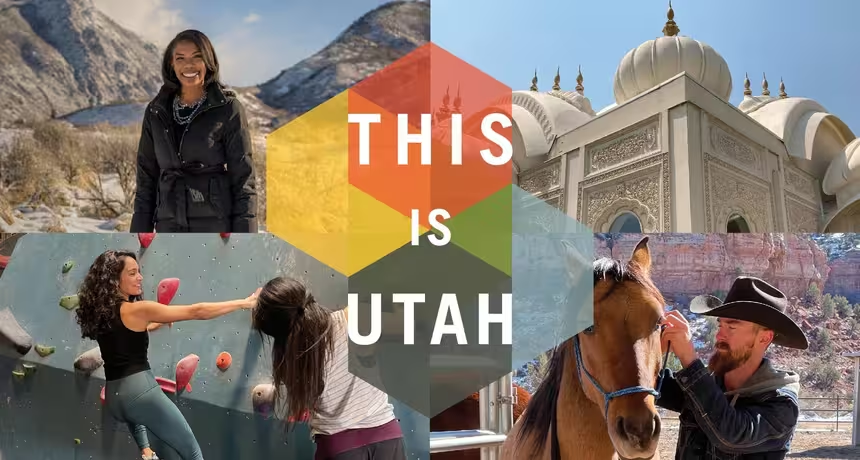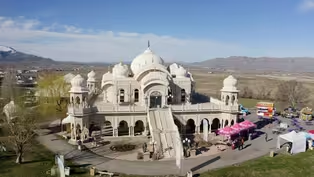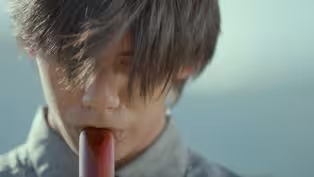
Song of the Paiute Native Youth Group
Clip: Season 4 Episode 3 | 6m 27sVideo has Closed Captions
Enjoy a cultural celebration through performances of a group of Paiute Indian Tribe youth.
The Paiute Indian Tribe of Utah's Native Youth program offers opportunities for kids to learn historical and cultural traditions and participate in important community events. They believe the kids hold the key to a full recovery from a past clouded by the wrongful termination of the Paiutes' Federal recognition, which was reinstated in 1980 through the collaboration of the five constituent bands.
Problems playing video? | Closed Captioning Feedback
Problems playing video? | Closed Captioning Feedback
This Is Utah is a local public television program presented by PBS Utah
Funding for This Is Utah is provided by the Willard L. Eccles Foundation and the Lawrence T. & Janet T. Dee Foundation, and the contributing members of PBS Utah.

Song of the Paiute Native Youth Group
Clip: Season 4 Episode 3 | 6m 27sVideo has Closed Captions
The Paiute Indian Tribe of Utah's Native Youth program offers opportunities for kids to learn historical and cultural traditions and participate in important community events. They believe the kids hold the key to a full recovery from a past clouded by the wrongful termination of the Paiutes' Federal recognition, which was reinstated in 1980 through the collaboration of the five constituent bands.
Problems playing video? | Closed Captioning Feedback
How to Watch This Is Utah
This Is Utah is available to stream on pbs.org and the free PBS App, available on iPhone, Apple TV, Android TV, Android smartphones, Amazon Fire TV, Amazon Fire Tablet, Roku, Samsung Smart TV, and Vizio.

This is Utah
Liz Adeola travels across the state discovering new and unique experiences, landmarks, cultures, and people. We are traveling around the state to tell YOUR stories. Who knows, we might be in your community next!Providing Support for PBS.org
Learn Moreabout PBS online sponsorship- The Southern Paiutes have called Southern Utah home for thousands of years despite hardship.
Now there's a renewed push to get youth from all tribal bands to embrace their heritage and keep Paiute traditions alive.
(Indigenous music of North America) - [Young Boy] I feel a heartbeat.
(Indigenous music of North America) - A heartbeat is the drum beat of that drum.
- [Interviewer] Is it hard to memorize and remember all the steps?
- No.
- [Interviewer] Why is that?
- 'Cause I got 'em in my brain.
- When people are watching the performances at the Shakespeare - Yeah.
- Festival.
What are you hoping that the audience is gaining?
- For me, it's just a gaining and understanding of and acknowledgement of we are here.
I love it because it's an opportunity for our youth too, to show off their talent, that youth's personality.
(crowd cheering) (flute music) And that's really the excitement, whether they're showing off their dance, playing the flute, introducing themselves.
It's just that this the opportunity to really build confidence in themselves and take pride of their art, and our heritage and traditions.
- You're really lighting up as you talk about it.
- Yeah, it's exciting.
I love it.
- So the flute doesn't really have sheet music.
When I perform, it's all in harmony, so I'm composing it on stage right there and then so I just make up everything right there.
And it sounds nice.
- Yeah.
That's what a flute does, there's not really any music for it.
- Yeah.
- You just play how you feel at the time.
So if you feel like sad, you'll probably play kind of sad.
If you feel happy, you'll play a happier song.
- Thank you.
- There are a lot of programs now.
There's camps and and different things to get the youth involved.
- Yeah.
- Why is that important?
- I think that it's really important because it just provides us another opportunity to help share that knowledge.
With some of the hardships that the tribe faced through termination, through relocation, and through the the boarding school eras that the tribes had to face, we did lose a lot of our culture.
We lost a lot of our language.
(ominous music) - They went through genocides and all of this, to get us where we are today, and we're here and we're carrying on where they left off, as strong native people.
It's so important that we get the kids to carry it on because without them we're gonna, it's gonna be gone.
It's their identity to have the language, the culture and tradition.
(crowd applauding) - My name is Zariah Attakai, and I'll be dancing for elders and who can't dance.
My parents told me about my culture so I was interested in it.
Sounded cool, sounded fun.
(Indigenous music of North America) Makes me feel joy and it makes me feel have lots of attention and it makes me feel happy.
(crowd cheering) - New' knee, nee huyn, Lydia.
Eeme-ah-knee, knee ya-hunt?
- The kings have tried to hold onto our language.
- New' knee, nee yuhn, Ashton.
New' nungwu, new' See' veets eng.
- As long as there's someone who can speak the language, there's always hope.
- New' nuwu, new' Mo'ahv pah.
- Poo knee kay vum, pei kai.
- As we do more, as we go into some of the traditional teachings and, you know, our Paiute teachings and what's maybe taught like whether it's in the powwow arbor or, you know, within some of our ceremonies, it's a lot about the respect and having that pride and really it helps you stay on the right path.
(flute music) - [Interviewer] Have you seen them at the Shakespeare Festival perform?
- Oh, god.
My granddaughter at the time was a queen and she did the Fancy Shawl and I almost cried.
I mean, it was just so emotional.
I was just seeing them really doing working hard at what they were doing and, you know, bringing it to the people and showing exactly the beauty of our culture and tradition.
It was, it was great.
(Indigenous music of North America) And I got all emotional and everything and they help preserve our culture and they bring it back and they make our kids feel proud of who they are, you know, I see pride out there.
- As we learn more, as we educate more, as we reconnect back with our ancestors with some of those teachings, with our land, with our people, with our families, you know, it really helps build that sense of who we are and that connection.
(Indigenous music of North America)
Video has Closed Captions
Clip: S4 Ep3 | 9m 57s | Welcome to the sanctuary whose love and care for animals has become a national phenomenon. (9m 57s)
Video has Closed Captions
Clip: S4 Ep3 | 7m 50s | The Shri Shri Radha Krishna Temple is a place of worship and an iconic landmark in Utah. (7m 50s)
Utah's Heritage Highway | Preview
Preview: S4 Ep3 | 30s | Travel Utah's Heritage Highway stretching 500 miles from the northern to southern border. (30s)
Providing Support for PBS.org
Learn Moreabout PBS online sponsorshipSupport for PBS provided by:
This Is Utah is a local public television program presented by PBS Utah
Funding for This Is Utah is provided by the Willard L. Eccles Foundation and the Lawrence T. & Janet T. Dee Foundation, and the contributing members of PBS Utah.


















